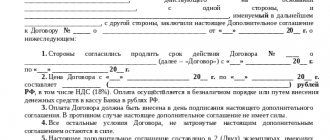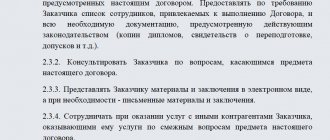Penalty under a contract for the provision of paid services: concept, legal regulation
The main regulatory legal act regulating the establishment of a penalty, its form, size, etc., is the Civil Code of the Russian Federation (hereinafter referred to as the Civil Code), in which § 2 in Chapter 22 is devoted to this method of securing obligations, as well as a number of separate rules (in particular, Art. 12, 64, 207, etc.).
In addition, important sources of regulation of the issue are business customs, as well as judicial practice. Thus, the rules on penalties are further considered and specified in the resolution of the Plenum of the Supreme Court “On the application by courts of certain provisions of the Civil Code of the Russian Federation on liability for violation of obligations” dated March 24, 2016 No. 7, Review of judicial practice of the Supreme Court No. 2 (2016), approved by the Presidium Sun 07/06/2016, and a number of other judicial acts.
In accordance with paragraphs. 1 and 2 tbsp. 330 of the Civil Code, a penalty as a way to ensure that the parties fulfill their obligations under a transaction has the following characteristics:
- represents a certain amount of money;
- is established by agreement of the parties or may follow from a rule of law;
- occurs as a result of a party’s failure to fulfill its obligations or performance in violation of certain terms of the contract, for example deadlines;
- paid in the interests of the injured party (creditor);
- is not related to the existence of losses of the party whose interests in the transaction were violated;
- should only be done in cases of guilt in the actions of the performer (for failure to fulfill an obligation due to the actions of the creditor himself, no one has the right to demand payment of a penalty).
These signs constitute the concept of a penalty.
Amount of penalty for a penalty under a service agreement sample
In paragraph 45 of the resolution of the Plenum of the Supreme Court of the Russian Federation No. 7 dated March 24, 2016, it is explained that the penalty established by law or by agreement of the parties for violation of a monetary obligation is applied instead of interest for the use of someone else’s money under Article 395 of the Civil Code of the Russian Federation. That is, if the insurance company violates the obligation to pay insurance compensation, a penalty can be demanded under paragraph 5 of Article 28 of the Law “On the Protection of Consumer Rights.” In this case, the penalty should be calculated not on the amount of insurance compensation due to you for this insured event, but on the amount of the insurance premium (cost of the service).
Interestingly, if your contractor committed several violations at once (for example, he first violated the deadline for eliminating defects in the work, and then the deadline for returning money on a claim), you can ask for a penalty for each violation.
Legal penalty under a service agreement
Penalty, including under a contract for the provision of services, by virtue of clause 1 of Art. 330 of the Civil Code can be established by the parties as one of the conditions of the concluded transaction or follow from a legislative act. In the second case, its additional stipulation in the contract or a separate agreement is not required, and the customer has the right to demand its payment regardless of the presence of a corresponding condition in the contract.
Legal penalties under a service agreement are established by various regulatory documents, including:
- for violation of the rules and terms of transportation under contracts for the provision of services for the transportation of passengers, baggage or cargo by various modes of transport - the Charter of road transport and urban ground electric transport, the Charter of railway transport, the Code of Inland Water Transport, the Air Code;
- violation of the terms of provision of services by an economic entity to an individual under the relevant agreement - clause 5 of Art. 28, art. 30, paragraph 3, art. 31 of the Law “On the Protection of Consumer Rights” dated 02/07/1992 No. 2300-1 (3% of the cost of services or the total price of the contract, if it is not possible to separate the cost of services separately);
- refusal to voluntarily satisfy the consumer’s legal requirement under a service agreement - clause 6 of Art. 13 of the Law “On the Protection of Consumer Rights” dated 02/07/1992 No. 2300-1 (50% of the amount awarded by the court in favor of the recoverer-consumer);
- violation of the terms of delivery of a postal item or money transfer under an agreement for the provision of postal services - Art. 34 of the Law “On Postal Services” dated July 17, 1999 No. 176-FZ (3% of the postage fee per day when sent by ground transport or the difference between the cost of air and ground postage when sent by plane).
There are other types of legal penalties, including in relation to the recipient of services, including utilities.
PENALTY FOR DELAY UNDER THE SERVICE AGREEMENT: HOW TO ESTABLISH IN THE AGREEMENT, ACCRUAL AND COLLECT?
The contract for the provision of services may provide for a penalty for violation of the terms of provision of services, for late payment for services rendered, provision of documents, etc. This article will discuss the types of penalties for delays under a service agreement, the procedure for collecting the penalty, as well as how to compensate for your losses if the penalty is not established by the contract.
TYPES OF PENALTIES FOR DELAY UNDER A SERVICE AGREEMENT In theory, penalties are divided into 4 types: set-off (the amount of the collected penalty is deducted from the amount of damages to be collected) exclusive (collection of the penalty excludes the recovery of damages) alternative (the party has the right to choose: to collect the penalty or losses) punitive (damages are collected in addition to the penalty, in excess of the amount of the penalty) The contractor and the customer in the service agreement may provide for a different nature of the penalty. In addition to the theoretical significance, the definition of the type of penalty also has a practical significance, which lies in the fact that the collection of a contractual or legal penalty, with the exception of a penalty that is punitive in nature, excludes the accrual of interest for the use of other people's funds under Art. 395 of the Civil Code of the Russian Federation, and the collection of a fine allows for the simultaneous collection of interest under Art. 395 of the Civil Code of the Russian Federation (Resolution of the Plenum of the Supreme Court of the Russian Federation dated June 28, 2012 No. 17). In practice, the parties to the service agreement establish a penalty in the form of a percentage for each day of delay, the so-called late fees (for example, 0.1%, 0.5%, 1% for each day of delay), or the amount of the penalty can be equal to refinancing rate, key rate (since 2016, the refinancing rate is equal to the key rate), can be set, for example, 1/150, 1/300 of the refinancing rate, key rate, or the amount is set as a fixed amount, including for each day of delay (for example, 1000 rubles for each day of delay). Also, the contract may contain a limitation on the total amount of the penalty (“but not more than 5% of the contract amount”, “but not more than 10% of the cost of unpaid services”, etc.). The amount from which the penalty is calculated also varies (from the entire contract price, from the price of unpaid services, unprovided services, etc.). Therefore, when calculating penalties for late payments, it is necessary to carefully study the terms of the contract and take into account all the conditions for calculating penalties for late payments under the service agreement. A penalty (fine) can be established for various violations of the terms of the contract, delay in fulfilling an obligation: violation of the deadlines for completing services, violation of the payment deadline for services, unmotivated early termination of the contract, failure to provide documents, violation of the deadline for returning money, eliminating deficiencies in services, warranty repairs, etc.
CALCULATION OF PENALTY UNDER A SERVICE AGREEMENT The rules for calculating penalties under a service agreement are established by the service agreement. Let us give an example of calculating a penalty for late payment of services, established as a percentage of the cost of unpaid services for each day of delay. For example, the contract establishes a penalty amount of 0.5% of the cost of unpaid but provided services for each day of delay. The deadline for payment for services is no later than 03/25/2019, that is, the delay began to flow from 03/26/2019. Services were actually paid for on April 29, 2019. The cost of unpaid services is 3,000,000 rubles. Thus, the period of delay is 35 days. Penalty = 0.5% x 3,000,000 rubles x 35 days = 525,000 rubles. The calculation of the penalty may be complicated, for example, by partial repayment of the debt in several payments or other circumstances of the case. You can calculate the penalty under a service agreement online using the convenient calculator below. The calculator can take into account partial execution for an accurate calculation.
INTEREST UNDER ART. 395 of the Civil Code of the Russian Federation UNDER THE CONTRACT FOR THE PROVISION OF SERVICES Interest under Article 395 of the Civil Code of the Russian Federation is accrued for failure to fulfill a monetary obligation (for example, in case of violation of the deadline for the return of money under the contract for the provision of services, the deadline for payment for services rendered, the deadline for the return of materials transferred by the customer). At the same time, untimely transfer of an advance by the customer is not the basis for charging interest for the use of other people's funds under Art. 395 of the Civil Code of the Russian Federation (this position is confirmed by judicial practice, for example, Resolution of the Arbitration Court of the Moscow District dated July 24, 2018 No. F 05-10740/2018 in case No. A 40-207814/2017). Interest for the use of other people's funds is calculated based on the key rate of the Bank of Russia that was in effect during the corresponding periods of delay. However, the service agreement may establish a different interest rate. The simultaneous accrual of interest under Article 395 of the Civil Code of the Russian Federation and the penalty provided for in the contract for late fulfillment of a monetary obligation is not allowed, except in cases provided for by law or the contract (in particular, the accrual of interest and a penalty is allowed). The accrual of interest on interest (compound interest) is not permitted unless otherwise provided by law. Under agreements for the provision of services concluded when the parties carry out business activities, the use of compound interest may be provided for in the agreement. If the amount of interest accrued based on the rate specified in the agreement is disproportionate to the consequences of violation of the obligation, the court, at the request of the debtor, has the right to reduce the amount of such interest, but not less than to the amount determined based on the rate specified in Art. 395 of the Civil Code of the Russian Federation, that is, up to the key rate. In addition, interest for violation of a monetary obligation, as a general rule, can be accrued on interest that is a payment for the use of funds (for example, interest under Article 317.1 of the Civil Code of the Russian Federation).
HOW TO CORRECTLY CALCULATE INTEREST UNDER ARTICLE 395 of the Civil Code of the Russian Federation? Formula for calculating interest under Art. 395 of the Civil Code of the Russian Federation looks like this: Amount of interest = Amount of debt x Interest rate (by law or agreement) x Number of days of delay / Number of days in a year / 100 Determine the amount of debt. Amount of debt - the amount of debt for services rendered or “unpaid advance” for services not provided, etc. If the debt includes VAT, then we recommend charging interest on the amount of the debt including VAT (Resolution of the Presidium of the Supreme Arbitration Court of the Russian Federation dated September 22, 2009 No. 5451/09). This is due to the fact that you must pay VAT on accounts receivable without waiting for the debt to be paid, that is, from your own funds. A debtor who has not fulfilled his payment obligations on time actually uses your funds. When calculating the amount of debt on which interest is charged, also consider the rules for calculating interest on interest (compound interest). Determine the number of days of delay. Accrue interest from the day of delay (the day following the day the payment/performance of services expires and until the day of actual fulfillment of the obligation, for example, payment of a debt, performance of services, etc. When calculating the period of delay, pay attention to the deadlines for the proper fulfillment of obligations under the contract, they can be set in different ways (for example, in calendar or working days). Also, when determining the first day of the period of delay, remember the rule for postponing the deadline if the last day of the deadline falls on a non-working/holiday (in the online calculator below, non-working days are taken into account based on the production calendar) . We determine the rate for collecting interest. If the interest rate is not provided for in the agreement, use the key rate of the Bank of Russia. It is determined depending on the period in which the delay occurred. That is, if during the period of delay under the service agreement different key rates were in effect, it is necessary to calculate interest for each period of the rate during the period of delay. You can calculate interest under Art. 395 of the Civil Code of the Russian Federation at the key rate, taking into account the periods of validity of the rate on the calculator located below. POSSIBILITY OF REDUCTION
PENALTY AND INTEREST UNDER ART. 395 of the Civil Code of the Russian Federation BY THE COURT The parties to a service agreement have the right to establish any amount of the penalty (both penalties and fines), except for cases where the amount of the penalty is established by a regulatory legal act (for example, in government contracts). However, when collecting a penalty in court, the guilty party may petition to reduce the penalty if it proves that the amount of the accrued penalty is clearly disproportionate to the consequences of the violation of the obligation. The court also has the right to reduce the penalty on its own initiative, except in cases where the obligation is violated by a person carrying out business activities (in this case, a reduction in the penalty is possible only if there is an application from the guilty party to reduce the penalty). To reduce the penalty, the court must prove that collecting the penalty in the amount stipulated by the contract may lead to the creditor receiving an unjustified benefit. These provisions are enshrined in Article 333 of the Civil Code of the Russian Federation. However, these provisions are interpreted and applied in practice by different courts (judges) differently. An interesting example from judicial practice on the application of Art. 333 of the Civil Code of the Russian Federation when collecting a contractual penalty under a contract for the provision of services: the Supreme Court sent the case for a new trial, since the court of first instance did not consider the defendant’s petition to reduce the penalty and did not give a legal assessment of his arguments in connection with the stated petition, thereby violating the provisions of Art. Art. 8, 9, 41, 159 of the Arbitration Procedure Code of the Russian Federation, thereby depriving the defendant of judicial protection. In this case, the subject of consideration by the Supreme Court was a case that is common in practice: the plaintiff filed a claim for the recovery of a penalty. The defendant stated that the penalty was disproportionate to the consequences of failure to fulfill the obligation, and asked to reduce the penalty under Art. 333 Civil Code of the Russian Federation. The court did not reduce the penalty, and the decision did not reflect in any way the reason for the non-application of Art. 333 of the Civil Code of the Russian Federation, did not evaluate the defendant’s application. The Supreme Court of the Russian Federation considered this fact grounds for canceling the court decision and sending the case for a new trial. Determination of the Judicial Collegium for Economic Disputes of the Supreme Court of the Russian Federation dated 03/06/2019 in case No. 305-ES 18-20112, A 40-97378/2017. The court also has the right to reduce interest under Art. 395 of the Civil Code of the Russian Federation, the amount of which is established by the contract, if the amount is disproportionate to the consequences of violation of the obligation, at the same time, interest cannot be reduced below the rate established in Article 395 of the Civil Code of the Russian Federation, that is, the key rate (often courts in practice adhere to this rule and when contractual penalties are reduced).
INTEREST UNDER ART. 317.1 of the Civil Code of the Russian Federation UNDER THE CONTRACT FOR THE PROVISION OF SERVICES The contract for the provision of services may provide for the accrual of interest on a monetary obligation, provided for in Art. 317.1 Civil Code of the Russian Federation. These interests represent a fee for the use of funds and have a different legal nature that distinguishes them from interest under Art. 395 of the Civil Code of the Russian Federation and from contractual penalties, which in turn represent a measure of liability for violation. Therefore, if the accrual of such interest is provided for in the contract for the provision of services, then these interests and interest under Article 395 of the Civil Code of the Russian Federation or the penalty provided for in the contract can be collected simultaneously. The amount of interest under Art. 317.1 of the Civil Code of the Russian Federation may be provided for in the contract for the provision of services. If it is not provided, then these interests are accrued at the key rate of the Bank of Russia in force during the relevant periods. At the same time, interest under Art. 317.1 of the Civil Code of the Russian Federation are accrued not from the date of violation of the deadline for fulfilling the obligation, but from the date of making the advance payment. The difference in the legal nature of interest under Art. 317.1 of the Civil Code of the Russian Federation also leads to another important conclusion: the rules for reducing penalties provided for in Art. 333 of the Civil Code of the Russian Federation, do not apply when collecting interest accrued under Art. 317.1 Civil Code of the Russian Federation. At the same time, the provisions of Art. 317.1 of the Civil Code of the Russian Federation are not subject to application to rights and obligations arising from contracts concluded before the entry into force of the Federal Law of March 8, 2015 No. 42-FZ “On Amendments to Part One of the Civil Code of the Russian Federation,” that is, before 01.06. 2015.
Calculation of penalties under a service agreement
Penalty based on clause 1 of Art. 330 of the Civil Code can be established in the form of a penalty or a fine. In the case of a fine, no additional calculations are required, since it is established in the form of a firm fixed amount and is payable regardless of the period of delay in fulfilling the obligation. Penalties are calculated using a special formula, the multipliers of which also follow from the decision of the Supreme Arbitration Court dated February 20, 1996 No. 8244/95.
The formula for calculating penalties in the form of penalties under a contract for paid services is as follows:
P = Rn × Co × Dpr,
Where:
- P - penalty in the form of a penalty;
- Rn - the amount of the sanction for failure to properly provide services within the period established by the contract, established as a percentage for each day of delay;
- Co - the cost of a service that was not provided or was provided in violation of the terms of the contract or the quality of provision;
- DPR - the period of delay in the proper provision of services, measured in calendar days.
Penalty for terminating a service agreement sample
For example, the inability of the contractor to unilaterally refuse to perform the contract without a legitimate reason. Thus, if you “confuse” these two agreements, you may encounter unexpected consequences. There is only one essential condition of a contract for the provision of services: the subject is the activity that the contractor must carry out on the instructions of the customer. When defining the subject, do not limit yourself to standard formulations and general phrases, but describe in detail what exactly is included in a particular service.
The parties agreed on the possibility of its termination by the customer at any time after conclusion, subject to compensation to the contractor for a penalty (fine). The customer terminated the contract, but did not pay the stipulated penalty. Does the customer have the right to refuse to fulfill a contract for the provision of services for a fee, subject to payment to the contractor only of the expenses actually incurred by him in accordance with clause 1 of Art. 782 of the Civil Code of the Russian Federation, despite the fact that the contract contains a condition on the possibility of its termination by the customer at any time after conclusion, subject to payment of a penalty (fine) to the contractor?
Results
Thus, the penalty under a service agreement, despite the specifics of the legal relationship, is calculated according to the standard formula when it comes to penalties. In this case, the amount of the penalty interest is either established by agreement of the parties or follows from a legislative act. The fine is a fixed amount of money that must be paid by the contractor in the event of failure to properly provide the service within the period specified in the contract.
See our materials on calculating penalties under other contracts:
- “Forfeit under a supply agreement - procedure for calculation and collection”;
- “Forfeit under a contract - the procedure for calculation and collection.”
You can find more complete information on the topic in ConsultantPlus. Free trial access to the system for 2 days.








